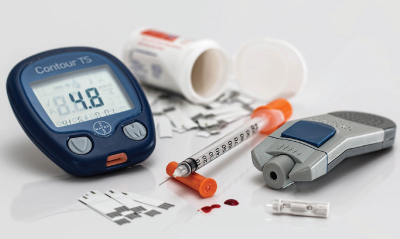
Are you careful of Hypoglycemia?
Posted on December 30, 2017 with 0 comments
What is hypoglycemia?
Diabetes control is all about maintaining a healthy blood sugar level (< 80 – 130 mg/dL) 1. While
a decrease in blood sugar level might cheer you, it can as much worrisome as high blood sugar is.
Hypoglycemia may be defined as an episode consistent with an abnormally low blood glucose(less than 70 mg/dL) level. The American Diabetes Association (ADA) recommends that diabetic patients with
a blood glucose level of 70 mg/dL should be alert to the possibility of developing
hypoglycemia.
What causes hypoglycemia?
Hypoglycemia is more likely to be seen in
- Patients with type 1 diabetes
- Patients with longstanding insulin-treated type 2 diabetes (>10 years)
- Drug-induced hypoglycemia
Taking some precautionary methods on a daily basis can reduce the chances of hypoglycemia
considerably, such as :
- Regular meals daily
- Frequent Glucose monitoring
- Proper intake of medicines, as suggested by doctors
- Avoiding alcohol
Why is it harmful?
Hypoglycemic attacks must be prevented because
- They are harmful to patients with cardiovascular disease
- Frequent attacks may cause permanent neurological damage and worsening of
retinopathy - Long-term diabetic patients with a history of frequent hypoglycemia may sometimes not
be able to report the symptoms of hypoglycemia, a condition known as hypoglycemic
unawareness. This may result in the patient not taking adequate measures to cure
hypoglycemia in time.
What are the signs and symptoms of hypoglycemia?
Although hypoglycemia is clinically detected by checking the blood glucose level, early
recognition of the signs and symptoms is necessary to prevent its harmful effects:
- Autonomic symptoms: palpitations, rapid heartbeat, tremor, sweating and chills
- Neurogenic symptoms: confusion, irritation, dizziness, fainting
Why are elderly patients more at risk of hypoglycemia?
Hypoglycemia is especially a common problem in the elderly population as:
- Modification of counter-regulatory hormonal responses to hypoglycemia may lead to
hypoglycemic unawareness - Elderly patients present with poor cognition and depression which may affect their self-
care ability and erratic timing of medication intake. - Multiple co-morbidities like renal impairment, chronic heart disease, malnutrition, and
interactions with medicines taken for different ailments, all may increase the risk of
hypoglycemia.
How can hypoglycemia be prevented?
Prevention of hypoglycemia considers certain principles:
1. Diabetes self-management: Patients must be explained the risks factors and the
symptoms of hypoglycemia. They should be warned about the dangers of missed meals,
unplanned vigorous exercise and alcohol. They should carry sugar with them at all times
and swallow it at the first symptom of hypoglycemia. Patients on insulin therapy should
avoid swimming, working near machines and driving till the dose is stabilized.
2. Self-monitoring of blood glucose: Using a glucometer, the patient can keep an account
of their glycemic level; especially useful in hypoglycemic unawareness.
3. Professional support and guidance: A doctor’s educator’s guidance must be taken to
set individualized glycemic goals (especially for elderly patients) as also for an
appropriate insulin and other drug regimens.
How is hypoglycemia treated?
1. Eat/Drink 15g Carbs (15g Carbs = 4-5 pieces of hard candy/3 teaspoon sugar/tube of
glucose gel)
2. Wait for 15 minutes
3. Again check blood
4. If less then 70 mg/ dl? Repeat step 1 to 4.
5. Repeat step 1-4 another 2 times.
6. If goals not reached, the patient must be hospitalized and intravenous glucose injections
or intramuscular drugs (glucagon) are needed for the management.
Take home message
Hypoglycemia is a concern in the glycemic management of diabetes. Glycemic control should be
individualized based on patient’s characteristics and multiple medications are taken. Accordingly,
avoidance of risk factors, recognition of hypoglycemic symptoms, regular blood glucose
monitoring with appropriate drug regimens will provide a better glycemic control, minimizing
the risk of hypoglycemia and prevent long-term complications.
At Advanced Diabetes Center (ADCPL), we take every single element related to the patient’s
individual likings, history of medications, and cultural and religious preferences in consideration
to meticulously prepare the diet and nutrition regime, regular consultations, and a
comprehensive and personalized treatment plan to assist patients throughout their journey.
References
1. American Diabetes Association. (2016). Available from: http://www.diabetes.org/living-
with-diabetes/treatment- and-care/blood- glucose-control/checking- your blood-
glucose.html. Last accessed: 06.12.2017.
2. Wong C.W. (2015). Avoiding hypoglycemia: a new target of care for elderly diabetic
patients. Hong Kong Medical Journal. 21, pp. 444-445.
3. Cryer P.E., Davis S.N. and Shamoon H. (2003). Hypoglycemia in Diabetes. Diabetes Care.
26(6), pp. 1902-1912.
4. Section 3. Drugs affecting major organ systems. Chapter 31. The control of blood
glucose and drug treatment of diabetes mellitus. In: Rang and Dale’s Pharmacology 8 th
Edition. (2016). Eds. Rang H.P., Ritter J.M., Flower R.J. and Henderson G. Elsevier
Churchill Livingstone, London. pp. 388-389
5. Shafiee G., Mohajeri-Tehrani M., Pajouhi M. and Larijani B. (2012). The importance of
hypoglycemia in diabetic patients. Journal of Diabetes & Metabolic Disorders. 11. pp. 1-7.
6. Diabetes.co.uk. Diabetes and Hypoglycemia. (2017). Available from:
https://www.diabetes.co.uk/Diabetes-and- Hypoglycaemia.html. Last accessed:
06.12.2017.
7. Section 13. Drugs used in endocrine disorders. Chapter 65. Pancreatic hormones,
Antidiabetic drugs and Pharmacotherapy of Diabetes Mellitus. In: Pharmacology and
Pharmacotherapeutics 24 th Edition. (2015). Eds. Satoskar R.S., Rege N.N. and Bhandarkar
S.D. Reed Elsevier India Pvt. Ltd and Popular Prakashan Pvt. Ltd, New Delhi. pp. 1365.